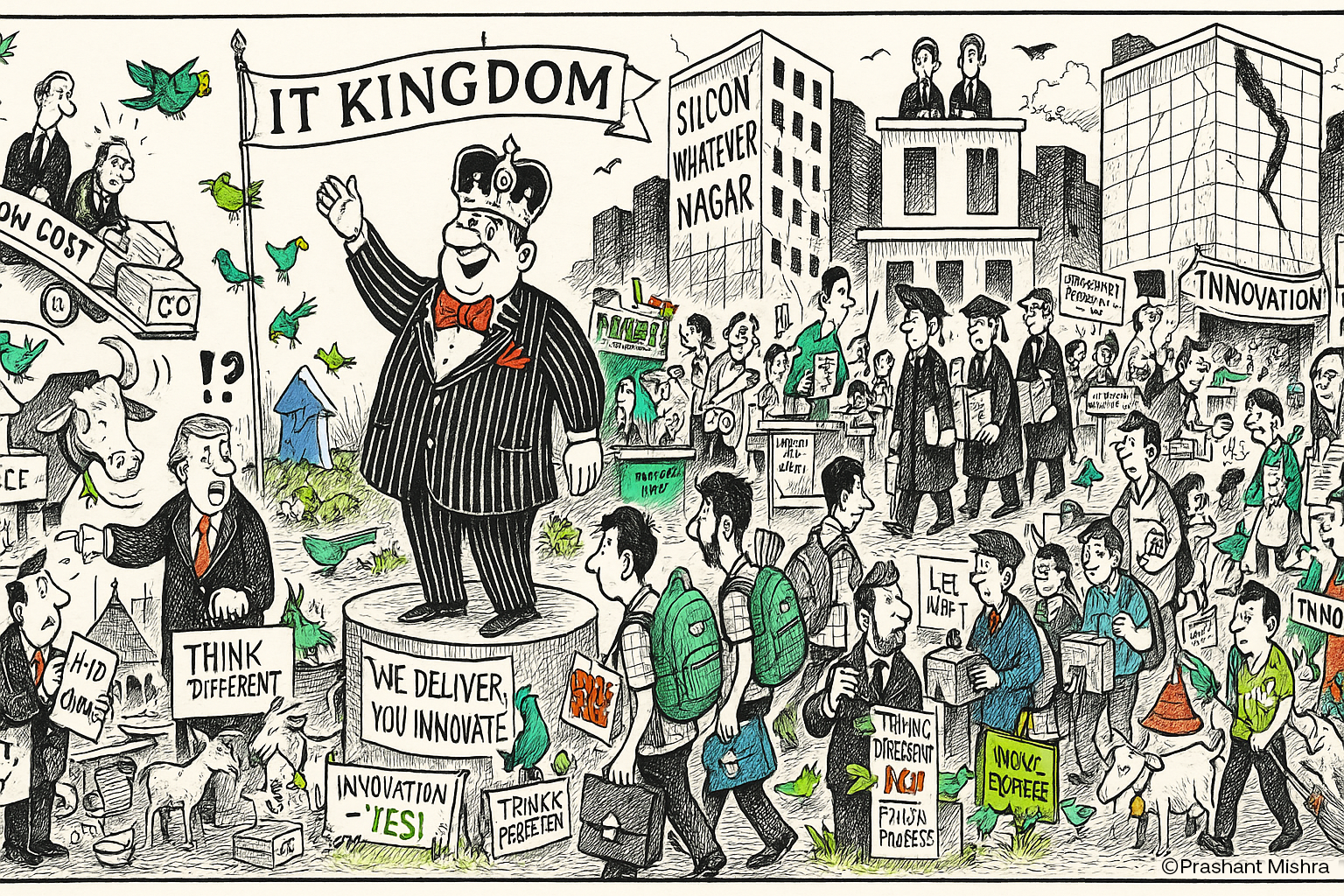
What The Agile Manifesto Teaches Us About Life?
Stop trying to find or lose yourself; keep it simple, silly.
So, I hear these two different versions of how to live your life; one side passionately talks about finding yourself, through which you will find the purpose of your life. The other side stands at another pulpit and sermonizes that it’s not about finding yourself; instead, it’s about losing yourself in a cause or passion that engulfs your body and soul. Being the high priests that they are, they have very convincing arguments about their respective stands. Surprisingly, individuals rarely go beyond stating their opinions and offer strategies to transform them into tangible realities. When you ask such questions, they'll say, well, that’s for you to find out. Hell yes, Holy Father!
A commonsense goes that, “Don’t be a bird." Which means that it’s damn easy to fly overhead and crap. In other words, provide opinions. But it’s hard to come down and clean the shit. That's the message I want to convey to these individuals. Please, sir, don’t be a bird.
I have my own opinions, but they are mine. I have worked hard at them; sometimes they have helped me succeed, and sometimes they have ensured that I failed. More of the latter than the former. But what makes me proud is that they are mine; I live with them, and I have made peace with them.
Being a technologist, I find solace in technical solutions rather than the “mental masturbation” that management philosophies stimulate. The primary reason is that most of the time, technical solutions are black-and-white as compared to the often-colourful management tenets. The way I look at it, we already have enough “technicolour” in life, and although it adds to the beauty, it hides the contrasts (not the sharp ones, but the ones that are subtler). That’s because our minds are designed to home in on the prettiness of the picture and the warm fuzzy feelings that it engenders, and in the process, we tend to miss out on the details. So, sometimes black and white is good.
This leads me to the application of Agile principles in my daily life. By definition, Agile Software Development is a group of software development methodologies based on iterative and incremental development, where requirements and solutions evolve through collaboration between self-organizing, cross-functional teams. The Agile manifesto has 12–14 principles. I have picked 10, which I believe are the most appropriate to reflect the points that I want to make.
- [AGILE] The highest priority is to satisfy the customer through early and continuous delivery of valuable software. [LIFE] The “customer” is you, and the “valuable software” is happiness. Happiness depends on what you want to make of it. The well-being of your spouse, the education of your children, the hobby that you nurture but can’t really follow up on, the profession you want to pursue, etc. Look for that far and wide; leave no stones unturned.
- [AGILE] Welcome to changing requirements, even late in development. Agile processes harness change for the customer’s competitive advantage. [LIFE] Things change frequently and rapidly; learn to deal with them. You have it all set, and then suddenly the requirement for your happiness changes. Don’t sweat; pick up the gauntlet and run with it. Make hard decisions to deliver the software not for anyone else but for the “customer’s competitive requirements.”
- [AGILE] Deliver working software frequently, from a couple of weeks to a couple of months, with a preference for the shorter timescale. [LIFE] Often, in our daily routines, we spend too much time planning and strategizing. This means that in Agile, there is analysis paralysis. The point should be to deliver it immediately. I don’t mean to say go on impulse, but I do mean to say that just follow the lead to deliver working software; it may not be the best, but you will know what it is not and what your next course of action should be.
- [AGILE] Build projects around motivated individuals. [LIFE] In adult life, we have to make allegiances to our company, community, etc. That’s inevitable. Proceed, but ensure that your "software development project" revolves around individuals you trust to assist you in achieving your goals. In addition to their kindness and goodness, you should seek out the "motivation" within them. The motivation is to help you achieve your happiness. If you don’t find it, or if they run out of steam, then be firm in replacing or rejecting them. It’s not unethical to do that; they would or will do that to you if the situation arises.
- [AGILE] Give them the environment and support they need and trust them to get the job done. [LIFE] This follows from the point above. After gathering “motivated” people, let them do their thing. Believing is important in getting to a goal, and trust is an important factor. But the subtler concept here is “trust but be wary.” If it’s not going the way you wanted it to, revert to Point 4.
- [AGILE] The most efficient and effective method of conveying information to and within a development team is face-to-face conversation. [LIFE] In whatever position you are in, you are working for your team. Similarly, your team is working with you. If the objective is slipping past you or if the timelines are being extended, reach out and talk. Talk directly and firmly. Make sure you have all the information you need to make a decision. And be prepared; sometimes the issues can lie within and not outside.
- [AGILE] Continuous attention to technical excellence and good design enhances agility. [LIFE] This is one place where I agree with management pundits on both sides of the divide. Yes, I have been talking about your happiness all this time, but the key point here is that your happiness lies in the heart of your unhappiness. The journeys of all great men remind us that it’s not the easy things that make their lives interesting. The off-beat path that they took made others ridicule, snub, or supersede them. The things that initially made their lives miserable ultimately led them to become super-stars. Beat yourself hard for each failure. Don’t go with the “wisdom of the crowd.” Learn to persevere. Because, in the end, it's excellence that really matters. Find the path and pursue it with all your heart and energy.
- [AGILE] Simplicity—the art of maximizing the amount of work not done—is essential. [LIFE] Our society has the wrong opinion about successful individuals. It says that the people who achieve a lot are the ones who are hard-working. Right? Wrong. A donkey is hard-working too, but I have yet to see a successful donkey. The basic thing about human nature is the tendency toward inertia. All great religions talk about this as their moot point: peace, contentment, inaction, or whatever you will. What that means is not to be lazy; what it actually means is to have affirmative action and restraint. Hard work should come with the purpose of getting things done quickly and efficiently so that you can return to a state of inertia. Here, I do have to give credit to the management gurus who termed this “work smarter, not harder.” Extricate yourself from environments where you are forced to do activities repeatedly for the sake of perfection or reaching a goal. That will not help you achieve your objectives.
- [AGILE] Agile processes promote sustainable development. [LIFE] If you have understood the above nine points, then this is a no-brainer. Adult life is less about the glamorous jobs that we do and more about boredom, petty frustration, and routine. In this petty frustration and routine crap, the art of “making a choice about one’s thought” and “building agility in oneself” will come in handy.
- [AGILE] Working software is the primary measure of progress. [LIFE] There's nothing much to add here. Replace “working” with “contented” and “software” with "happiness.”
I don’t want to teach a lesson on morals here because I am like you. I know that doing all this is hard because it requires tremendous effort and willpower. So some days you might be up to it, while some days you might just flat line. I don’t know how to find myself, and I really don’t know how I can lose myself either. But I do know that there is a subtler way to journey through life’s murderous meanderings.
In my opinion, Agile shows you a hazy reflection of that way. In all its twists and turns, Agile principles in life are all about awareness, discipline, and attention in a myriad of petty, unsexy ways. We have all been educated, but in reality, we are just literate, not educated. The real value of education is not about "knowledge," but rather about awareness of what is real, what is essential, and yet always hidden in plain sight.
Therefore, I would advise you to cease your search for self-identity. Be yourself. Keep it simple, and if you don’t like the way things are, move on.


